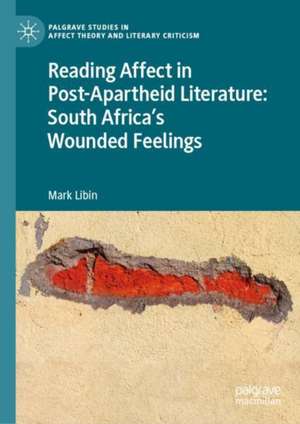Reading Affect in Post-Apartheid Literature: South Africa's Wounded Feelings: Palgrave Studies in Affect Theory and Literary Criticism
Autor Mark Libinen Limba Engleză Hardback – 13 oct 2020
This book examines South Africa’s post-apartheid culture through the lens of affect theory in order to argue that the socio-political project of the “new” South Africa, best exemplified in their Truth and Reconciliation Commission Hearings, was fundamentally an affective, emotional project. Through the TRC hearings, which publicly broadcast the testimonies of both victims and perpetrators of gross human rights violations, the African National Congress government of South Africa, represented by Nelson Mandela and Archbishop Desmond Tutu, endeavoured to generate powerful emotions of contrition and sympathy in order to build an empathetic bond between white and black citizens, a bond referred to frequently by Tutu in terms of the African philosophy of interconnection: ubuntu. This book explores the representations of affect, and the challenges of generating ubuntu, through close readings of a variety of cultural products: novels, poetry, memoir, drama, documentary film and audio anthology.
| Toate formatele și edițiile | Preț | Express |
|---|---|---|
| Paperback (1) | 385.84 lei 43-57 zile | |
| Springer International Publishing – 14 oct 2021 | 385.84 lei 43-57 zile | |
| Hardback (1) | 390.84 lei 43-57 zile | |
| Springer International Publishing – 13 oct 2020 | 390.84 lei 43-57 zile |
Preț: 390.84 lei
Nou
Puncte Express: 586
Preț estimativ în valută:
74.79€ • 78.29$ • 61.88£
74.79€ • 78.29$ • 61.88£
Carte tipărită la comandă
Livrare economică 07-21 aprilie
Preluare comenzi: 021 569.72.76
Specificații
ISBN-13: 9783030559762
ISBN-10: 3030559769
Pagini: 263
Ilustrații: XII, 263 p. 1 illus.
Dimensiuni: 148 x 210 mm
Greutate: 0.48 kg
Ediția:1st ed. 2020
Editura: Springer International Publishing
Colecția Palgrave Macmillan
Seria Palgrave Studies in Affect Theory and Literary Criticism
Locul publicării:Cham, Switzerland
ISBN-10: 3030559769
Pagini: 263
Ilustrații: XII, 263 p. 1 illus.
Dimensiuni: 148 x 210 mm
Greutate: 0.48 kg
Ediția:1st ed. 2020
Editura: Springer International Publishing
Colecția Palgrave Macmillan
Seria Palgrave Studies in Affect Theory and Literary Criticism
Locul publicării:Cham, Switzerland
Cuprins
Chapter One: Apartheid’s Bitter Fruit.- Chapter Two: Domestic Bliss.- Chapter Three: “Revealing is Healing”: Ubuntu, the TRC Hearings, and the Transmission of Affect.- Chapter Four: Seeing and Time: Durational Time in Ubu and the Truth Commission and Long Night’s Journey into Day.- Chapter Five: Compassion Fatigue: White Empathy and White Guilt in Antjie Krog’s Country of My Skull and J.M. Coetzee’s Disgrace.- Chapter Six: Shame, Guilt, and Complicity in Mark Behr’s The Smell of Apples and Sindiwe Magona’s Mother to Mother.- Chapter Seven: Conclusion: How Close is Too Close? Anger, Reconciliation, and the “Born Free” Generation.
Notă biografică
Mark Libin is Associate Professor in the Department of English, Theatre, Film & Media at the University of Manitoba, Canada.
Textul de pe ultima copertă
This book examines South Africa’s post-apartheid culture through the lens of affect theory in order to argue that the socio-political project of the “new” South Africa, best exemplified in their Truth and Reconciliation Commission Hearings, was fundamentally an affective, emotional project. Through the TRC hearings, which publicly broadcast the testimonies of both victims and perpetrators of gross human rights violations, the African National Congress government of South Africa, represented by Nelson Mandela and Archbishop Desmond Tutu, endeavoured to generate powerful emotions of contrition and sympathy in order to build an empathetic bond between white and black citizens, a bond referred to frequently by Tutu in terms of the African philosophy of interconnection: ubuntu. This book explores the representations of affect, and the challenges of generating ubuntu, through close readings of a variety of cultural products: novels, poetry, memoir, drama, documentary film and audio anthology.
Caracteristici
Presents a new perspective on contemporary South African identity Utilizes affect theory as part of the critical dialogue of nation-building Provides strategies for reading postcolonial literature













